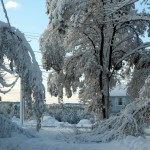State Rep. Donald Humason (R-Westfield) said he plans to support a bill that would put the pressure on utility companies to restore power and communicate with customers quickly, following major weather events.
Last week, the Massachusetts Senate unanimously passed such a bill.
Humason said he expects the bill will come before the House and pass quickly.
“I think by and large what they did was really good,” said Humason. “We are most likely going to pass a very similar piece of legislation – we want to get it in place.”
Humason said a letter was drafted following the Oct. 29 snowstorm that left thousands across the commonwealth without power for as long as a week, with some communities suffering for even longer. Humason said it was not just because of the response to the freak snowstorm, which he said was devastating and not expected to be as powerful as it was.
“Nobody was prepared for an October storm,” he said. “But there were a series of storms and problems that were not being addressed.”
Humason said that investor-owned utilities seemed to have the most problems. Municipal utilities responded well, he said.
“When we wrote to the state regulators, we said the groups that responded best were the municipal utilities like Westfield, Holyoke and Chicopee,” said Humason.
He praised the response of Westfield Gas and Electric and said that even though his own power was not restored for nearly a week, he was well-informed.
“I checked their Facebook page and web site and there were regular updates so you knew what streets were being worked on,” said Humason. “So you knew where the crews were and when they would be getting to people.”
Westfield Gas and Electric General Manager Daniel Howard said all utilities had a tough time following the October storm.
“Every utility, whether municipal or investor-owned, had to deal with incredible challenges left in the wake of that October storm,” said Howard. “Resources were stretched and communications hampered. I believe, and the feedback we’ve received confirms, the WG&E did a good job keeping the Westfield civic leaders, emergency response personnel, local media and, most importantly, our customers, informed throughout the process.”
The WG& E set up a 24-hour call center, utilized print, television and social media and all mutual aid and contract line crews were accompanied by a WG&E employee.
“In addition to line crews, we also utilized tree and road clearing contract crews to clear the way, in many instances, prior to the line crews’ arrival on site for repair work,” said Howard. “Also, following any significant outage event, the WG&E utilizes a complete debriefing process to develop improved methods for future use.”
A lack of communication from the big companies was one of the complaints from residents and legislators. The bill passed by the Senate requires twice-daily updates to residents 24 hours after a storm’s end. The legislation also would also force each utility to pay a proportionate share into a $460,000 annual fund that would cover the cost of storm response investigations by the state Department of Public Utilities, which regulates the electric companies. The measure would also assure that if a utility pays a penalty for violating storm response procedures, the money would be returned to ratepayers in the form of credits to their bills.
The Department of Public Utilities is continuing a separate investigation of the utilities’ response to the storms.
State Rep. Nicholas Boldyga (R-Southwick) said in the days following the Halloween storm he heard from many residents who were frustrated with Western Massachusetts Electric Company and its response there. For many, said Boldyga, it was a safety concern.
“I spoke to many elderly residents, some of whom were n oxygen and had health concerns,” said Boldyga. “Some people were without power for five to seven and even eight days. And those with wells had no water.”
Boldyga said he definitely supports legislation to make utilities responsible for their response to major weather events. Boldyga said he believes what was passed by the Senate was a good piece of legislation. However, he wished it had some component of a proposed moratorium on utility mergers.
Senate President Therese Murray (D-Plymouth) said she also heard from many frustrated constituents after the storms.
“No one expected power to be restored immediately, but there were people without power for a week or longer in some cases, with no knowledge of an anticipated response time,” Murray said in a statement after the vote last week. “That is unacceptable.”
Sen. Stephen Brewer (D-Barre) said there was more anger in his district over the outages than any other issue he has encountered in more than two decades in the Legislature. He also noted that one person who lived in his district died while waiting for power to be restored after the October snow.
“Enough is enough,” Brewer said.
“The aftermath of the storms exposed profound problems in the utility companies’ ability to organize and effectively respond to damages, as well as communicate with customers and municipalities,” said Senator Michael R. Knapik (R-Westfield.) “This legislation is the first step to ensure we are all better prepared for future events. I look forward to continuing the conversation on how to improve upon this legislation in the months to come,” Knapik added.
Attorney General Martha Coakley sent a letter to lawmakers last month asking that any storm-related penalties assessed to utilities be credited to customer’s bills.
“The Senate’s action to advance this storm response bill will greatly assist our continuing efforts to protect ratepayers by holding utilities accountable for safety and reliability at reasonable costs,” Coakley said.
The legislation, which now moves to the House, would also require utilities to designate a liaison in each community during an emergency response period and set up a call center within Massachusetts so consumers can get updated information.
Utilities could also be placed in receivership, under the bill, in cases of “gross negligence” after storms.


